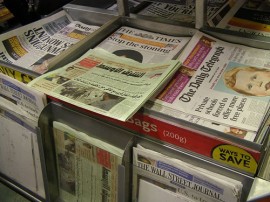
A response to my complaints about Euroscepticism in the press has asked, not unreasonably, what I would do instead. Should there be some kind of regulation?
At present, there is the Press Complaints Commission’s Code of Practice, which says this about accuracy:
(iii) The Press, whilst free to be partisan, must distinguish clearly between comment, conjecture and fact.
I said previously that it is fine for newspapers to have opinions, but not to tell lies. The problem with reporting on politics is that false information can be conveyed as opinion and is thus, in the eyes of the code, legitimate. The statement “I am against the Lisbon treaty because it will lead to a European army” is perfectly allowable, even though the Lisbon treaty would do no such thing. (Any decision about a European army would be taken by unanimity, just as it would be now, or even just as it would be were there no European Union at all.)
I don’t have a suggestion of how the wording of (iii) could be revised, and I suspect that probably it can’t without making matters worse. The quality of the comment that newspapers carry reflects the respect that newspapers have for their readers, and this seems to be low and getting lower.
In addition to reporting unfounded statements as opinions, there is another trick that newspapers can use, namely their headlines. The front page of the Sunday Express on 24 August 2008 screamed in large letters “Europe bids to hijack our medals”, above a story about a proposal that there should be an EU listing in the Olympic medals table. However this was not a proposal from the European Union, nor the European Commission, nor from any official body, but from a youth organisation, JEF. (This is a rare example, along perhaps with the Bullingdon Club, when student politics that makes the front page of a national newspaper.)
But the headline word “Europe” conveys an entirely different impression. As it was intended to.
The equivalent behaviour in advertising is strictly prohibited. For example, the atheist bus campaign has been obliged to include the word “probably” in its statement “There’s probably no god” to satisfy the advertising regulators.
I repeat, I don’t have a proposal as to how to change the regulations and most of the obvious changes would restrict press freedom too far – as the PCC code says, “There is a public interest in freedom of expression itself.” In a free country, we have to rely on how the press itself behaves.
